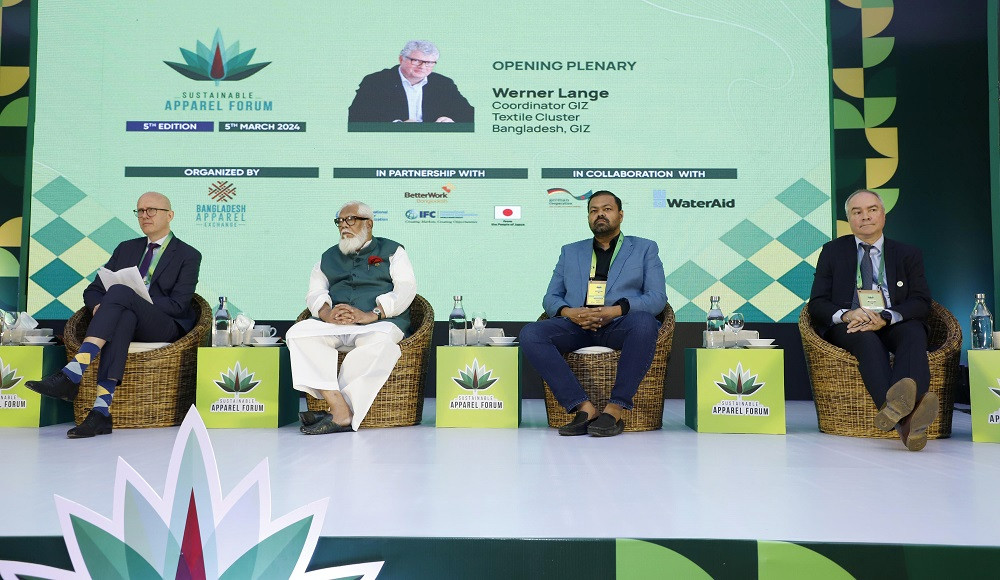Decent working conditions must to attain sustainable development
Says ILO Country Director Tuomo Poutiainen
Daily Sun Report, Dhaka
Published: 05 Mar 2024

Guests attend the Sustainable Apparel Forum (SAF) at Radisson Blu hotel in Dhaka on Tuesday. PHOTO: COURTESY
The Country Director of the International Labour Organization (ILO), Tuomo Poutiainen, on Tuesday called upon all stakeholders to create safe and dignified working conditions for all workers.
“Decent work is fundamental to sustainable development. By prioritising fair wages, safe working environments, and opportunities for career advancement, we can ensure the well-being of workers and the long-term success of the apparel industry,” Poutiainen said this while addressing at Sustainable Apparel Forum (SAF).
With a view to promoting decent work that focuses on a more ethical, equitable, and environment-friendly industry, Bangladesh Apparel Exchange (BAE), ILO-IFC Better Work Bangladesh, GIZ and WaterAid organised the SAF at Radisson Blu Dhaka.
“Compliance, price competitiveness, accident protection system, and insurance system for long term compensation are significant. In this context, collaboration is crucial. So, social dialogue should be focused on how to comply with labour laws,” he also said at the panel discussion there.
In the opening ceremony on the day, highlighting the role of international cooperation, Ambassador and Head of Delegation of the European Union to Bangladesh Charles Whiteley reaffirmed the EU's commitment to supporting Bangladesh's efforts towards sustainability.
“Development cooperation plays a crucial role in promoting ethical practices, environmental conservation, and social inclusion within the apparel industry,” Whiteley noted.
Speaking there, the Prime Minister's Private Industry and Investment Adviser Salman Fazlur Rahman underscored the need for innovation, sustainability, and ethical practices for the sake of apparel industry’s development.
“The apparel industry is pivotal in Bangladesh's economic growth and development. We must prioritise sustainability and ethical practices to keep this momentum,” he also said. Salman also laid emphasis on the importance of continuous innovation and sustainable practices.
Bangladesh Investment Development Authority (BIDA) Executive Member Avijit Chowdhury emphasised the importance of development cooperation in achieving sustainable growth.
“Collaboration between government, industry, and international partners is essential to address the apparel industry's challenges and drive meaningful change,” he added.
Founder and CEO of Bangladesh Apparel Exchange Mostafiz Uddin said, “Through collaboration and innovation, we are shaping a future where sustainability and competitiveness go hand in hand in Bangladesh's apparel industry.”
In a panel session discussion, Vice President of the Bangladesh Garment Manufacturers and Exporters Association (BGMEA) Miran Ali stressed the need for sustainability to remain competitive in the global market.
“Sustainability is not just a moral imperative; it's also a business imperative. By adopting eco-friendly practices and ethical standards, we can enhance our competitiveness and secure a prosperous future for the industry,” he added.
President of the National Coordination Committee for Workers' Education (NCCWE) Mesbahuddin Ahmed called for greater empowerment and representation. “Workers are the backbone of the apparel industry. It's crucial that their voices are heard, and their rights protected,” he said.
The President of the IndustriALL Bangladesh Council Amirul Haque Amin said, “Healthy practice, and good industrial relations increase productivity. Tripartism, coupled with the involvement of international buyers, is very important for fostering harmony and sustainability within the apparel industry.”
More than 500 people from local and abroad joined in the SAF 2024. It included nine sessions with keynotes, presentations and plenary sessions on Vision Bangladesh 2024 and Beyond; Behind the Seams: Decent Work Conditions and Livelihood in the RMG Industry: Perspectives on the Roles of Women Workers and Supervisory Practices; Future Opportunities in Sustainable Innovation; Sustainable use of Water in the Apparel Sector: Challenges, Opportunities and Ways Forward; Energy Sustainability: Navigating the Transition for Apparel and Textile Manufacturing in Bangladesh.

